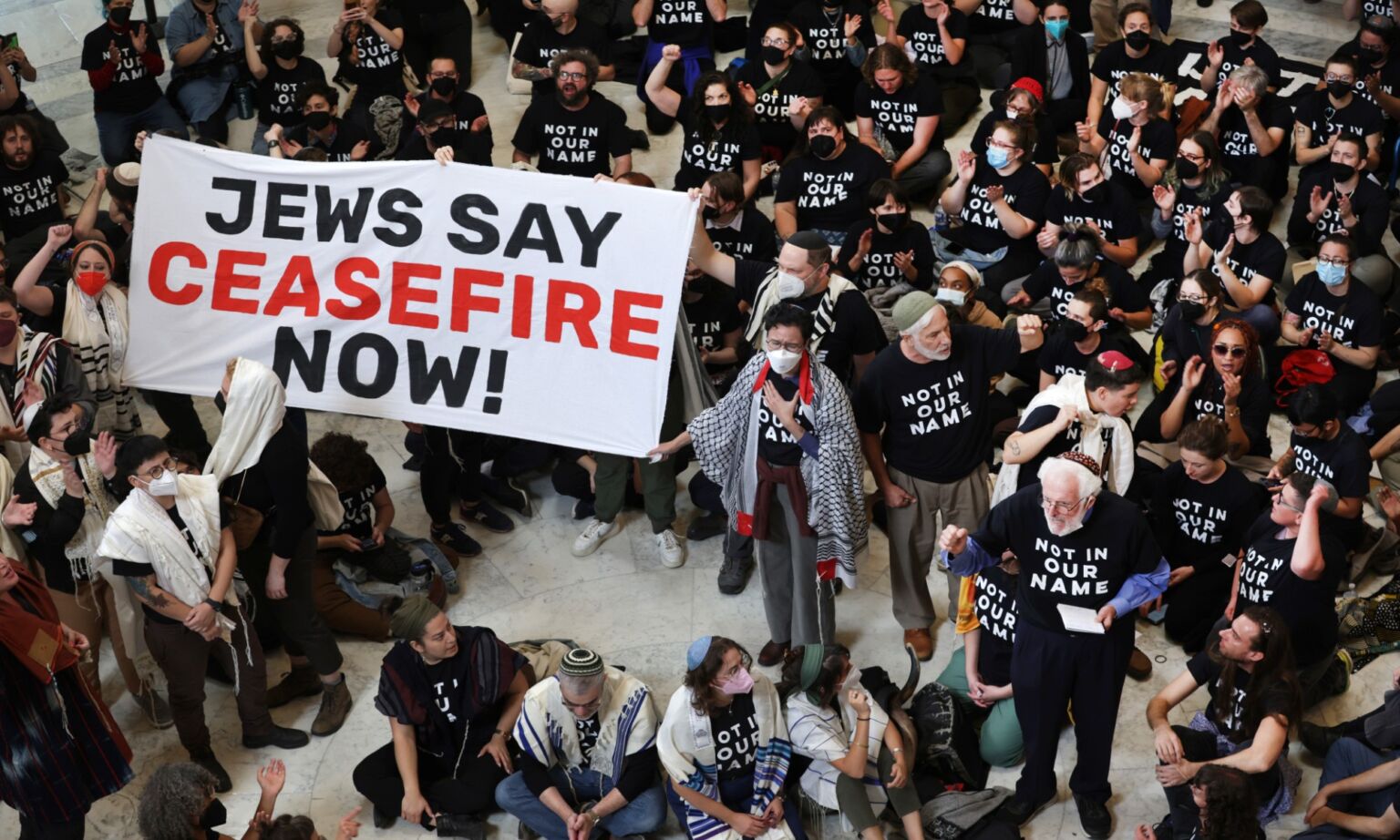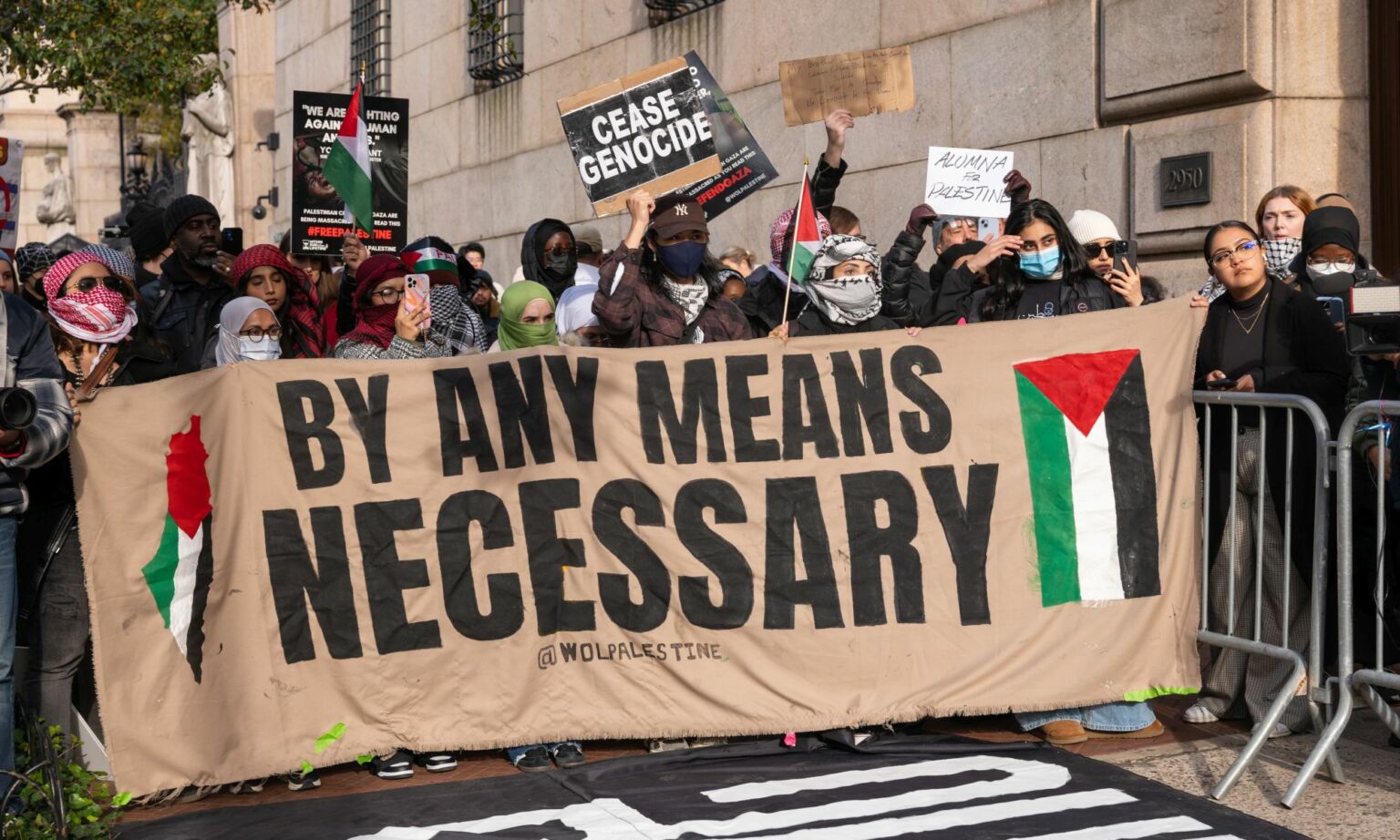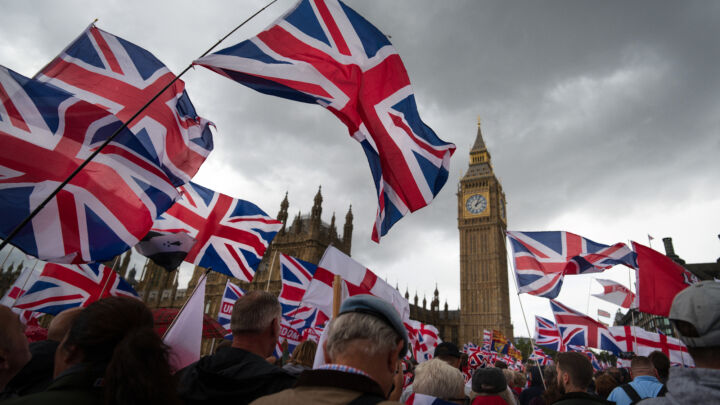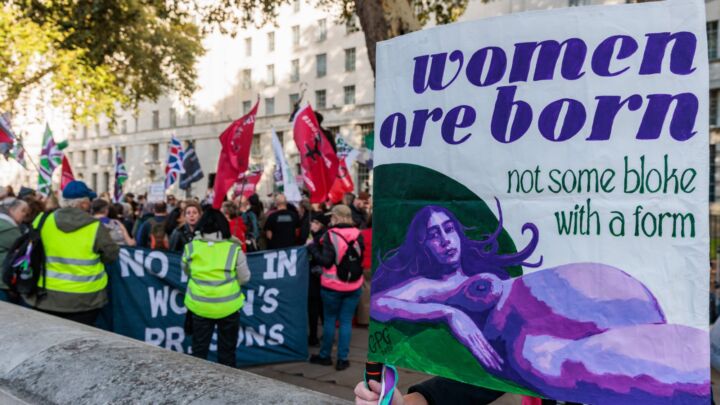
Long-read
The Jews’ coming civil war
The majority are battling ultra-nationalists to their right and Israel-hating 'progressives' to their left.
Want unlimited, ad-free access? Become a spiked supporter.
Whether right or left, Muslim or Christian, anti-Semites speak of Jews as people who pull the strings in culture, politics and especially finance. They assume we are all united in this conspiracy. In reality, not only is there no conspiracy, we Jews are also as divided among ourselves as any other people.
In their long history, the Jewish people have maintained a permanent unified state for no more than 120 years – and that was three millennia ago. It was then divided into two kingdoms before eventually being conquered and divided into separate entities. Devastation followed in the early years of the first and second centuries, when Jews revolted against the might of the Roman Empire.
Other divisions have developed over the centuries. There were notable conflicts between Zionists and anti-Zionists, and between backers of the USSR and America, which continued well into the 1960s. There were also splits between those who clung to ancient traditions, those who looked to jazz up the old faith and others who just walked away.
Today the split among Jews is largely three-way. There’s a zealot-like ultra-nationalist movement with considerable power and influence inside Israel, which could be losing a majority of Israelis and even key Zionists in the diaspora. Then there’s a relatively small, increasingly alienated but well-connected ‘progressive’ faction, which lines up against Israel. Finally, there is the majority – that is, the rest of us who cleave to a middle ground.
The zealots
Today a significant number of Jews, particularly in Israel, embrace an extreme concept of Zionism that parallels the ideas and ultra-nationalism that animated the original Zealots who fought the Romans nearly two millennia ago – and, in the process, extinguished the last strands of Jewish self-government. Those Zealots decided total independence was non-negotiable, and some ringleaders slaughtered any Jew who wished to accommodate Rome.
Those ancient Jews fought gallantly. But they also fought against each other, so that ‘the blood of all sorts of dead carcasses stood in lakes in the holy courts themselves’, as the ancient Roman-Jewish historian Flavius Josephus reported. To this day, on the occasion of Tish B’Av, Jews mourn the ensuing destruction of the Second Temple in 70 AD, an event precipitated by refusing to surrender to the conquering Romans. ‘As for our misfortunes’, Josephus laments, ‘we have only ourselves to blame’.
Today’s zealots, notes author Jacob Siegel, follow a similar ideological approach. They embrace what is widely called revisionism, the notion that Israel’s ‘land is indivisible’ from the Mediterranean to the Jordan. Unlike their antecedents, however, they are militarily sophisticated, and their enemies, though certainly bloodthirsty, are nothing like as fearsome as the Roman Empire.
This faction largely controls the current Israeli government, favours the expansion of settlements, denies any prospect for a Palestinian state and fends off any attempt, even by the United States, to impose limits on its ultra-nationalist vision. Although its members rely on the diaspora for political support and financial aid, they are also antagonistic towards it. As Ze’ev Jabotinsky, the founder of revisionism, stated in 1938: ‘Eliminate the diaspora or the diaspora will eliminate you.’
The modern zealots’ policies also provide grist for those who already have little love for either Israel or Jews. But it is easy for Jews living in the relative safety of the diaspora to underestimate the viciousness inherent in the conflict with the Palestinians. The Zionist conquest of Palestine was so violent in part due to unrelenting and uncompromising resistance among Arabs to even the notion of a Jewish state. Attempts to wipe out the Jews in the Middle East go back to the 1930s when the Yishuv, or Jewish settlement, suffered numerous massacres and pogroms. Some Zionists, and not only the extremists, retaliated with sometimes vicious assaults on both defenceless Arab civilians and British occupiers.
The mainstream of Zionism during the 1930s and 1940s was leftist, Western in culture, resolute and keen to find a modus vivendi with the Arabs, notably Jordan. In contrast, the revisionist wing of Zionism – including paramilitary groups like the Irgun and the Stern Gang – showed few qualms about committing atrocities, as well as indiscriminate attacks on occupying British forces.
Today’s zealots owe some of their success to the Palestinians’ refusal to compromise, preferring to resort to unmitigated terror. This has helped turn the right-wing Likud, now under the leadership of Benjamin Netanyahu, into the dominant political force in Israel for most of the past half century.
The current zealots are themselves broken into smaller factions, ranging from advocates for subtle territorial incrementalism, particularly in the West Bank, to support for the semi-permanent occupation of the region. Some, such as national-security minister Itamar Ben-Gvir, a follower of the late Meir Kahane, come close to a Jewish form of fascism.

Zealot Israel draws on Orthodox Jews for support, who are growing faster than the other denominations. This pattern can also be seen in the US, and in what many call ‘the second Israel’ – a reference to the growing, exiled Jewish community, made up of roughly one million Mizrahi Jews, driven out of Arab countries, and a massive influx from Russia.
The zealots have few allies outside Israel. They expressed understandable impatience with the bumbling Biden administration, lambasting those Jews backing the US as akin to Roman-era ‘Herodians’ – named after King Herod, the Jewish king who allied his dynasty to Rome.
But zealots’ notion of a truly self-sufficient Israel is fantastical. The US they castigate as ‘the empire’ is easily Israel’s largest export market and is responsible for two-thirds of the foreign-direct investment in its tech sector. As for advanced weapons, delinking from American arms would only make sense if Israel had the industrial base to produce enough of its own.
The zealots’ approach has had profound and damaging ramifications for Jews and Israel. It has helped erode support for Israel even among most Americans. They now rely on allies on the right. Yet these groups also contain anti-Semitic elements. Being a total satrap to Donald Trump leaves them, at the very least, exposed to the president’s latest whim.
The ‘progressives’
Most Jews continue to identify as Democrats in America, much as they once backed Labour in Britain, the Liberals in Canada and the Socialists in France. Left-wing Jews, like senator Bernie Sanders and those in progressive-dominated media and Hollywood, have already broken with Israel. The author David Grossman and other left-wing scholars have even embraced the ritual denunciation of Israel, as an ‘apartheid’ state and an inherently ‘genocidal’ regime.
In some ways, the progressives really are the new Herodians, heirs to that ignominious tradition of speaking yes to power which marked the days of Mark Antony to the end of the Julian dynasty. If pro-Roman Jews were seduced by classical Greco-Roman culture, progressive Jews have been influenced by the relentlessly anti-Israel coverage of media outlets like the Guardian, NPR, the BBC, Agence France Presse, CNN, MSNBC, Reuters, the New York Times and of course the state-controlled media of Russia and China. Outlets like the courageous Free Press may challenge, say, Hamas’s exaggerated claims of forced starvation. But such efforts have been ignored by the mainstream press, and treated with hostility by the progressive outlets further to the left.
Many left-leaning Jews seem more focussed on showcasing their virtue than seriously considering how Israel can deal with its murderous enemies. They also reflect the fact that, even before 7 October 2023, the majority of Jews disapproved of the current Israeli government. Netanyahu, a bungler whose failures on 7 October should have precipitated his downfall, is seen both by key Democrats and even many Jews as sustaining the war for his own political purposes. His regime has been described by the great Israeli historian, Benny Morris, as ‘the most corrupt’ regime in the Western world – an undoubted exaggeration, but with more than a grain of truth.
Amid the mainstream media’s unrelentingly anti-Israel coverage, support for the Jewish State among Democrats has fallen precipitously and is fading across the board, according to recent polling. Little wonder that universities, which were once major havens for Jews, have turned decisively against their Jewish students. Although Jewish himself, the head of the American Association of University Professors – the ultimate ‘confederacy of dunces’ – now also favours boycotts of Israeli professors. Tellingly, so-called progressives are not calling for the imposition of similar boycotts on the deeply repressive regimes of China, Russia, Iran or Qatar.
Today the majority of Senate Democrats, and even some candidates backed by Jewish-lobby giant AIPAC, oppose providing arms to Israel – a US ally in the midst of a war. Some, notably on the party’s leftist fringe, even embrace the kind of anti-Semitic memes that one also sees among French politicians like Jean Luc Mélenchon.

The ‘progressive’ animosity towards Israel is such that as many as 40 per cent of Jews may even vote for the openly anti-Zionist, pseudo-socialist Zohran Mamdani to be mayor of New York, the city with the largest Jewish diaspora in the world. This scion of Marxist royalty and favourite of Hamasniks has won the endorsement not only of anti-Israel politicians like senator Elizabeth Warren, but also of Jews like retiring congressman Jerry Nadler. He has garnered favourable coverage in the New York Times, too.
This would not be the first time the left has declared war on Jews and used Jews to do the persecuting. In The Secret of Chabad, rabbi David Eliezrie notes that during the Stalinist era, Communists, many of them of Jewish descent, hounded religious communities, closed synagogues and imprisoned rabbis. Starting in the 1950s, the USSR developed a strident form of anti-Zionism to appeal to third-world leaders, notably in the Middle East, employing graphic depictions of Jews in their propaganda that paralleled those of the traditionally anti-Semitic right.
All the essentials of modern anti-Semitism – the theory of settler-colonialism, charges of genocide and apartheid, and the assertion that Zionism is racism – were largely forged in Moscow. Stalin initially backed the Jewish State, although he later cracked down on Zionist agitation in Russia, eliminating Jewish activists. Stalin’s successors saw anti-Zionism as a wedge to use against the US, particularly in the Middle East.
Most demographers, like the University of Miami’s Ira Sheskin, see anti-Zionist Jews as a marginal group, albeit loud and portrayed sympathetically in the mainstream media. Eitan Hersh, who has studied college campuses, thinks anti-Israel Jews are roughly 15 per cent of the student body. Most tend to come from less successful and more irreligious homes. A large percentage identify as LGBTQ, which is remarkable given the attitudes of Hamas and Muslim countries towards homosexuality. These ‘un-Jews’, as one commentator put it, seem unlikely to work well with the vast majority that support Israel. Ultimately most Jewish progressives will blend into the progressive mass, having chosen political passion over their tribal identity.
The motley middle
Most Jews, in Israel and the Diaspora, are neither progressives nor zealots. They want the same things other people want – security, prosperity and hope for the future. Most Jews in the US, now constituting the vast majority of the diaspora, remain Democrats, although less so among the religiously engaged – particularly the Orthodox who are now firmly embracing the GOP.
But the big shift among Jews will be their assumption of a moderating role within the Democratic Party. Jews have already headed to the centre politically, embracing centrist candidates at the mayoral level – Richard Riordan and Rick Caruso in LA, Rudy Giuliani and Michael Bloomberg in New York, Daniel Lurie in San Francisco – and will likely look for a more centrist candidate in the 2028 presidential elections.
The woke Jews may get the headlines, but the majority is moving to the centre. For years, the Anti-Defamation League functioned largely as a subset of the Democratic Party, warning mostly about the lunatic fringe right. Now it realises it’s not neo-Nazi neanderthals who are to blame for the attacks on Jewish students or demands for boycotts of Israel. Nor is it primarily the descendants of the Brown Shirts who are torching synagogues, trashing kosher restaurants or hassling people in towns and cities across Australia, Canada, the UK and Europe. No, it’s the ‘progressive’ left and Islamists.

In the aftermath of 7 October and the subsequent surge in anti-Semitism, some Jews have taken their mezuzah off their homes and are increasingly cautious in wearing the Star of David on city streets. This is happening in once great Jewish havens like London, where the pro-Hamas Qataris reportedly own more property than the king, and in Amsterdam and Paris, too. In a notable shift, the best cities for Jews are those under right-wing control, notably Rome and Budapest.
Amid the rising tide of anti-Semitism, there has been what has been described as a ‘surge’ in Jewish community involvement. There has been a growing movement to fight back against anti-Israel indoctrination at both the grade-school level and on college campuses, where many Jewish students feel they must censor their views and hide their identity.
Like our forebears, Jews today will have to become more discerning, and opportunistic, in their alliances. It’s critical to establish ties to sympathetic minorities such as Hindus, anti-regime Iranians and, perhaps most importantly, Latinos. This includes figures such as New York’s Democratic representative Ritchie Torres or Santa Ana mayor Valerie Amezcua, who fended off the kind of anti-Israel resolutions already passed in progressive strongholds, such as Oakland, Berkeley, Richmond, Chicago, Detroit, Minneapolis and Atlanta.
In the current environment, Jews cannot afford to indulge in the mindless anti-Trump posturing of so many American liberals. The US president has remained both generally pro-Israel and opposed to anti-Semitism. Jews’ primary challenge will be countering the leftist push that has prompted some presidential hopefuls, like Pete Buttigieg, to abandon their previous pro-Israel positions. As it stands, the strongest support for Israel comes from Republicans, particularly from Christian evangelicals.
In Europe, where anti-Semitism is deeply entrenched, it may already be too late. The French Jewish population was declining even before 7 October. And embattled European leaders, from France’s Emmanuel Macron to Britain’s Keir Starmer, are more interested in wooing their nation’s growing Muslim electorate than protecting their shrinking Jewish constituencies.
Even in the US, the long-time Jewish safe-haven of New York could soon become increasingly hostile to all but progressive Jews. If, as seems highly likely, Zohran Mamdani becomes New York’s mayor, this city will move closer to Sadiq Khan’s London, and become a friendly turf for Hamas supporters. A Mamdani win will likely accelerate already existing demographic trends. When I was growing up in New York City in the 1960s, it used to be home to roughly two million Jews – or one in four New Yorkers. It’s now down to one million, just slightly above the almost 800,000 Muslims in the city.
Given these challenges, Jews need to unite rather than bicker. This does not mean embracing the nuttier zealot policies. As Jews like Josephus realised in their time, opposing ‘the power of Rome’ was suicidal. Israel today cannot continue to set itself against the total weight of world opinion, even in the US – especially if the increasingly anti-Israel Democrats get back in power.
To avoid repeating history itself, there needs to be an alignment with reality. Reasonable people, including Jews, recognise that ultimately a peace settlement means some prospect of accommodation with Arab aspirations, once the Palestinians, like many Arab states, finally accept the reality of Israel’s existence. As author and economist George Gilder has noted, Gaza and the West Bank, when integrated within the Israeli economy, enjoyed rapid growth – rather than turning into, as they are now, death-cult moonscapes.
Ultimately Jews know that some accommodation has to be reached. But until the Palestinians also seek it, the Jews will find ways to survive, as they have done for millennia. Whether they can again flourish both in Israel and the diaspora, depends on what the majority, the motley middle now do. Above all, that means resisting both the messianic bravado of the zealots and the supine surrender of the progressives.
Joel Kotkin is a spiked columnist, a presidential fellow in Urban Studies at Chapman University in Orange, California, and a senior research fellow at the University of Texas’ Civitas Institute.
£1 a month for 3 months
You’ve hit your monthly free article limit.
Support spiked and get unlimited access.
Support spiked – £1 a month for 3 months
spiked is funded by readers like you. Only 0.1% of regular readers currently support us. If just 1% did, we could grow our team and step up the fight for free speech and democracy.
Become a spiked supporter and enjoy unlimited, ad-free access, bonus content and exclusive events – while helping to keep independent journalism alive.
———————————————————————————————————————————–
Exclusive January offer: join today for £1 a month for 3 months. Then £5 a month, cancel anytime.
———————————————————————————————————————————–
Monthly support makes the biggest difference. Thank you.






Comments
Want to join the conversation?
Only spiked supporters and patrons, who donate regularly to us, can comment on our articles.